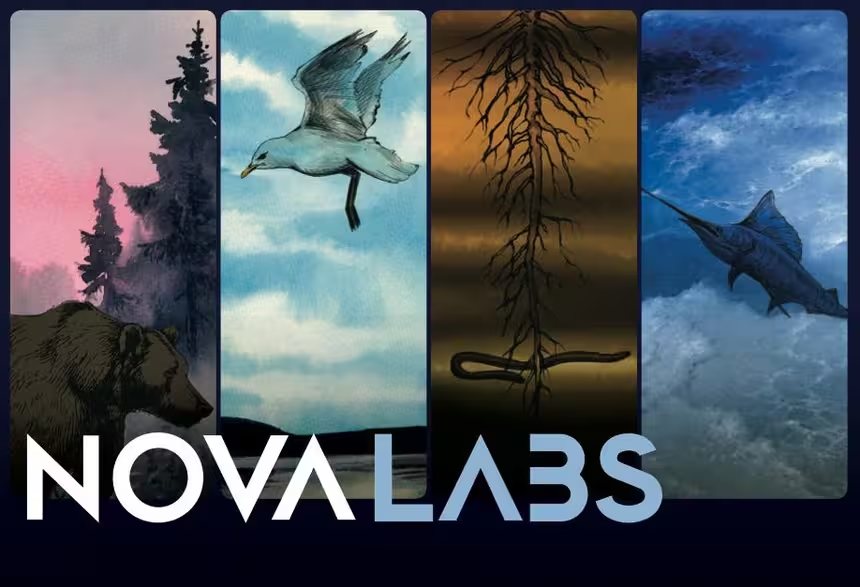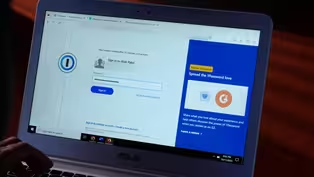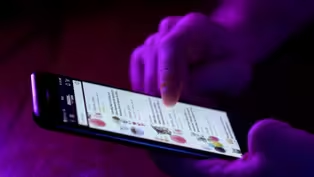
How to make your data more private online
Clip: Season 51 Episode 7 | 4m 2sVideo has Closed Captions
You do have some control in how much data you share online.
Online privacy isn’t a switch—it’s a dial. And you get to control how much data you share, and with who. Here’s how to make your data more private.
Problems playing video? | Closed Captioning Feedback
Problems playing video? | Closed Captioning Feedback
National Corporate funding for NOVA is provided by Carlisle Companies and Viking Cruises. Major funding for NOVA is provided by the NOVA Science Trust and PBS viewers.

How to make your data more private online
Clip: Season 51 Episode 7 | 4m 2sVideo has Closed Captions
Online privacy isn’t a switch—it’s a dial. And you get to control how much data you share, and with who. Here’s how to make your data more private.
Problems playing video? | Closed Captioning Feedback
How to Watch NOVA
NOVA is available to stream on pbs.org and the free PBS App, available on iPhone, Apple TV, Android TV, Android smartphones, Amazon Fire TV, Amazon Fire Tablet, Roku, Samsung Smart TV, and Vizio.
Buy Now

NOVA Labs
NOVA Labs is a free digital platform that engages teens and lifelong learners in games and interactives that foster authentic scientific exploration. Participants take part in real-world investigations by visualizing, analyzing, and playing with the same data that scientists use.Providing Support for PBS.org
Learn Moreabout PBS online sponsorship- [Alok] What can I do right now to protect my privacy and my security?
To learn tips and tools to preserve my data on both fronts?
I'm chatting with hacker and educator Matt Michell, - Where- - And cybersecurity expert, Eva Galperin.
First up, privacy.
Sorry, privacy.
(Alok whispering) Matt is a privacy advocate at Crypto Harlem as in cryptography, the process of hiding or coding information.
Okay, what do I do to make all this safer for me?
What do I do, who do I talk to?
How do I start?
- You have to ask yourself, is this a problem that needs to be fixed?
Privacy isn't a switch, it's a dial.
You get to control how much you share with who and with what.
Have you ever used this website called Google?
- I've heard of it.
- Yeah.
Well, let's check this out.
Well, if we go here to myactivity.google.com, it'll show us all the things that you've been doing.
So for example, when we go here, we see all the different Google services that you use.
I don't think they make a service you don't use.
- [Alok] These platforms are so deeply embedded in many of our lives and for good reason.
They make products that can be really useful.
It's hard for me to imagine going a single day without searching the web or using a navigation app, but they also suck up a lot of our data.
It's a trade off that I'm comfortable making within reason.
I didn't know this, but I can literally just delete huge amounts of data that Google is storing about me.
And the same is true for a lot of other services.
- We can dial to whatever level we feel comfortable.
For example, on LinkedIn, you would just click on Me and then you would go to your settings and privacy.
Here, when we go to Manage your activity, it tells you that you know, you started sharing your LinkedIn data with a permitted application.
- Treating privacy like a dial means it's not all or nothing.
You can have your data cake and eat it too.
Like now, I'm thinking that I want to log into everything, all my social media, my email, my LinkedIn, everything regularly and look to see who is using these.
- Exactly.
It is about awareness.
Furthermore, the companies, they know how many people actually use the privacy controls, and by you even peeking in it, you're saying, I believe privacy matters.
(bright music) - [Alok] At the Electronic Frontier Foundation, Eva shows me how I can take my privacy game to the next level.
(graphics smash) Learning some surveillance self-defense.
Although apparently not that kind of self-defense.
- So the next step in your privacy journey is fighting back against types of corporate surveillance.
And one of the things that websites really like to do is not just to track what you are doing on their website, but to track all the other websites that you go to, and they do this using cookies.
- There's some companies I trust and I'm like, fine, you have these cookies, they're chocolate chip, I know where they're made, I know what you're doing with them.
But then there's these third party companies, I don't want them around me.
- You can use a browser extension to eat these cookies and fight back against this kind of tracking, and keep those websites from seeing where else you're going.
- Browser extensions are add-ons for your web browser that give it extra features and functionality like eating cookies.
I'm imagining this, like, digital cookie monster that's eating up all these pieces of my online activity so that companies don't know what I'm doing online and it reduces the amount of privacy tracking.
Am I understanding that?
- What these browser extensions do is they get rid of the tracking cookies that these websites use to see all the other sites that you're going to, which is none of their business.
Are Your Online Passwords as Safe as You Think?
Video has Closed Captions
Clip: S51 Ep7 | 2m 22s | Your dog's name, birthday, and zip code do not make secure passwords. (2m 22s)
Is your phone listening to you?
Video has Closed Captions
Clip: S51 Ep7 | 4m 25s | It doesn’t have to – advertisers may already have all the information they want to know about you. (4m 25s)
Video has Closed Captions
Preview: S51 Ep7 | 30s | Find out who’s using your data and what you can do about it. (30s)
Providing Support for PBS.org
Learn Moreabout PBS online sponsorship
- Science and Nature

Capturing the splendor of the natural world, from the African plains to the Antarctic ice.













Support for PBS provided by:
National Corporate funding for NOVA is provided by Carlisle Companies and Viking Cruises. Major funding for NOVA is provided by the NOVA Science Trust and PBS viewers.





